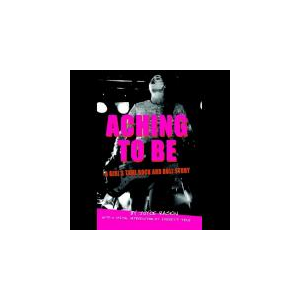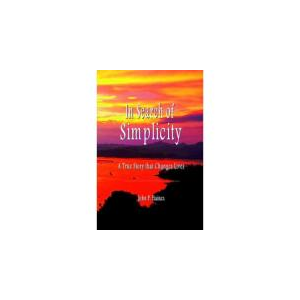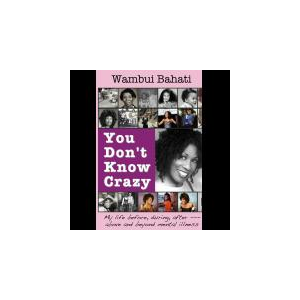Blue-eyed in Luhya-land
A rather normal Swedish couple in their fifties left their suburban life in Sweden in search of something new and better – a contrast to the secure Swedish Welfare State. They sold their small house, packed their belongings in a shipping container, and together with their dog left Sweden behind. They went to Africa.
This is the true story of how they, during five years, lived as the only Europeans in a small village at the edge of the last rainforest in Kenya. They moved from a stressed life to a simple one, a clay hut on a maize field in Western Kenya, without any modern conveniences. On their own, they built a small rainforest hotel as the start of a new life. But life turned out difficult; corruption, tribal traditions and witchcraft hindered the blue-eyed couple in their efforts to help the suffering villagers.
The story reflects this turbulent time with a lot of positive and negative experiences, arising in the meeting of contrasting cultures and traditions; Swedish meeting tribal Kenyan.
The Story Behind This Book
While on a safari in Masai Mara, I discovered a stone with some gold in it lying on the savannah. Being both of us old gold panners we decided to investigate that a little. The camp chef told us that he came from a town in Western Kenya - a town that was a real Eldorado for gold panners...
Media Mentions
Praise and Reviews
An Authentic View of Africa, June 2, 2010
This review is from: Blue-eyed in Luhya-land (Kindle Edition)
This is that rare thing an original, authentic and unvarnished view of Africa as told by an unbiased, idealistic yet pragmatic witness. This is a highly individual and admittedly European perspective but it may be more useful to establish here what it is not. It is not a travelogue, a sentimental sightseeing safari; it is not sensationalist journalism; nor is it a political manifesto with the familiar pre-packed conclusions; not an 'I was there' self-congratulatory and self-important tale of heroism, not another empty instalment of the New Age agenda. Rather, it is a factual, human (originally diarised) account of a remarkable and ultimately tragic adventure which took place in the unfamiliar, remote region of Western Kenya, deep in the emerald green forest on the slopes of Mount Elgon and close to Lake Victoria. Here, in the most densely populated yet least known, least 'developed' part of Kenya, there existed (still exists) a world remarkably untouched by western influence. This provides the backdrop to the couple's valiant efforts to establish a livelihood - through farming, then building and running a hotel (with a bit of gold-panning thrown in for fun) and finally pioneering a new form of enterprise in the form of mushroom cultivation. The scenes towards the end of the book (glimpsed in the opening chapter), of the couple literally fleeing the threat of mob violence, is as gripping as any fiction, with all the vividness and stark brutality we associate with the worst side of Africa, all the more powerful for its gradual build up through the story and, of course, its utter veracity.
This is a good antidote for the all too numerous superficial, lightweight and stereotypical pot-boilers coming off the press and jumping into airport terminal bookstalls (where they belong). Beautifully written, keenly observed and with a true sense of narrative, I found it hard to put down once caught up in the unerringly convincing and intensely human story.
----
The adventures of moving your life to a corrupt society, April 8, 2010
Amazon Verified Purchase(What's this?)
Blue-eyed in Luhya-land is a non-fiction adventure story, which I recommend to every adventure-loving person having a dream of exchanging his/her sheltered and comfortable life for a new one in a developing country.
A middle-aged Swedish couple moves to Africa in full assurance that the public law of their new country, like it has been in Sweden, will guarantee them protection and freedom of action. But as they are trying to build a new and better life, they find that they can not trust anyone or anything. Their dreams fall apart in a harsh reality where no laws are carried out in a correct way and where bribery is expected if you want to start any project, even if it is for the benefit of the suffering locals. Their life turns out a real roller-coaster ride; from one moment to the next they never know what will happen.
In their rural village, near the rainforest, corruption is regarded as normal; death is hiding behind the corner; your best friends steal your belongings but still expect to be regarded as friends. It is impossible to communicate because words do not mean the same thing for you as for them. The couple's dreams about helping others are gradually destroyed as they, the hard way, find out that tribal traditions and loyalty, witchcraft and violence are stronger than their wish to succeed. The couple and their belongings seem to be fair game for everyone. And they can not expect any help from the authorities either... Will the blue-eyed couple succeed or will they be defeated by local traditions, witchcraft and violence?
This book, in certain aspects, reminds me of another book that I liked very much as a child: Alice in Wonderland.
Erik
-------------------------------------------------------
Bente from Denmark:
So I have finished your book. I have been completely lost - just been
reading. I have been in Luhyaland, seeing all the beauty, smelling,
listening to the birds and all the noise from people. I like the book very
much and it is very well written. You describe the nature, the people and
the daily life very good.
------------
P. Eng, USA:
Blue-eyed in Luhya-land - a review
"Blue-eyed" is a charming book. It is the account of a Swedish couple,
weary of the back-home greyness, that decides to move to Kenya to start a new life in a simpler setting, away from the Nordic cold and the modern treadmill.
So, meet Gunilla, the author, and her husband Bertil, the driving motor
behind the Kenya project.
The plan: To establish a hotel/resort in the Kenyan highlands.
All doesn't go well. Almost from start there is a clash of cultures
between the Scandinavian couple and the local population. Gunilla and
Bertil refuse to adjust to the more-than-a-little corruption that
permeates the life in their new home. Firstly, there is an almost complete lack of infrastructure, from water to telecommunications to electricity to - worse! - the social and legal network that Europeans are accustomed to and depend on. Which means that if you encounter people and situations that don't treat you fairly, you are pretty much on your own.
Most striking is the utter lack of forward thinking on the part of local
dignitaries and the local population. You would think that the influx of
foreigners and especially foreign currency to an area that depends on
subsistence farming would be a good thing, and that the people and their
leaders would see this and support the venture. Not so. An immediate
handout (as a bribe is politely called) is chosen every time over the
establishment of a job-creating enterprise, just as the trinkets that can
be pilfered are chosen every time over job retention. This, unfortunately,
is very common and very international, I have seen charity hospital
projects in Asia go belly-up because local politicians asked for
"handouts" to grant the necessary permits that the donors simply couldn't afford.
The end of Gunilla's and Bertil's venture, not unpredictably, is defeat,
with their resources severely depleted and in disgust over the way things
are.
I recommend reading "Blue-eyed" in part for its entertainment value, in
part because there is actually quite a lot to learn from it: Build a local
alliance with a local strongman, even if you have smoothed the way.
Understand the local culture for what it is, rather than for what you are
used to or would like it to be, and sit on top of employee production from
day one.
Sadly, the only perfect vision is hindsight. I am sure that the Riverdale
Gardens venture would have ended differently if Gunilla and Bertil had the
insight then that they have now. It's too late to change that now, but any
reader with similar plans can profit from these experiences.
Happy reading!
----A Swedish couple in Kenya,
I'm in the safari business, so I have been to Kenya many times and made many friends in Kenya. I love that country very much. The people are so genuinely friendly and accommodating. However, I've never lived in Kenya, I always wanted to, but .... Anyway, it was with great anticipation that I embarked on reading this book, in my native Swedish. What an eye-opener! Wow! This very brave couple gave up all their comforts, everything they were accustomed to in their Swedish socialistic society and moved to Kenya where you are on your own to fend for yourself as they quickly found out. The laws of Kenya are not there to protect you, as they so naively thought, but to be used by those in power. I give this book three thumbs up for suspense and adventure with some very powerful witchcraft thrown in. A very different book from your regular safari journal.
Kristina Trowbridge "WinWin Vacations" (Seattle, WA USA)
----
Review: Blue-Eyed in Luhya-Land
 Blue-eyed in Luhya-land by Gunilla Fagerholm
Blue-eyed in Luhya-land by Gunilla Fagerholm
My rating: 4 of 5 stars
When circumstances and medical issues urge a Swedish couple to consider living abroad, they are captured and captivated by the beauty of the wilds of Kenya. Their dreams of owning and operating a modest resort soon run into the realities of living on the edge of civilization and all that entails. From the constant problems with power, phone lines, and water distribution to the constant betrayal by those they trust and ever-present issues of theft, Gunilla and her husband Bertil tried desperately to live where modernities are clashing with ancient tribal beliefs.
I picked this book up because, looking at an upcoming move to Africa, I am reading as much about the continent as possible. The experiences of Ms. Fagerholm and her husband are eye-opening, to say the least. And, having discussed them with people who have traveled back and forth to less developed areas Africa themselves, they are also completely believable.
Ms. Fagerholm’s first language isn’t English, and I was very pleasantly surprised at how well she translates her story. She is very descriptive, and you can sense the building desperation and exhaustion of their Kenyan life. What she does not do, however, is denigrate Kenya and its people. I think that after her experiences – which included times when the family legitimately feared for their lives and constant theft by employees – she might be forgiven for being overwhelmed with anger. And yet, what comes through most of all in her book is a feeling of sadness – of regret for what might have been.
The book begins with the end – so you know what the outcome will be. But it is the details in how that ending is reached that make the story so interesting.
------
This review is from: Blue-eyed in Luhya-land (Paperback)
Cover
I love the colors and photo editing on this cover. It has drawn me in since the first time I looked at it.
Plot
This is a very in-depth look at two people's new lives in a strange country. I was amazed at the situations that took place in the lives of Bertil and Gunilla while they lived in Kenya. These two individuals have to be made of strong fortitude and a determination that won't quit. There is no way that I would have lived five years in the same place going through all of the stress and worry they did.
Characters
Gunilla is the author and one of the people whose story is written in this book's pages. To make the decision to leave home and live in a foreign land (Kenya) is admirable.
Bertil is Gunilla's husband and lived with her in Kenya. He is Gunilla's calming influence and support system ... although there are times when he gets upset enough to speak and act out.
Overall
Blue-eyed in Luhya-land is a very enlightening look into what life is/could be like in Kenya for outsiders. I would recommend this to those who enjoy reading about other countries and ways of life.
---------------
*****
fascinating tale, December 7, 2012
By
Christian H. Gortz (australia) - See all my reviews
(REAL NAME)
Amazon Verified Purchase(What's this?)
This review is from: Blue-eyed in Luhya-land (Kindle Edition)
I enjoyed this book tremendously.Having spend time in Africa myself it was gripping to read about this weird/odd couple.I understood the dynamics and immersed myself in the writing .Moving story teller and very talented author.
----------------------
***
Easy, engaging read, February 19, 2013
Blue-eyed in Libya-land was an interesting glimpse into rural life in Kenya. It forced me to pause and consider my own preconceived notions about other cultures. I wish that chapters had been formatted chronologically with dates.
----
*****
What a story I could not put it down!, February 18, 2013
These people are amazing most people would have given up. What courageous people and what insanely generous people. I wanted so much for them to succeed against incredible odds. Whatever you are doing now I wish you luck,you deserve it. Great writing,riveting experiences. Compulsory reading for anyone planning a life change in Africa.
---
***
An average story., February 12, 2013
Appreciating that English is not the author's first language it was an 'okay' read. The author put her heart and soul in to her new life in Kenya which sadly it not work out.
---
*****
Blue-eyed in Luhya-land is worth reading, February 12, 2013
This is the story of a middle-aged Swedish couple trying hard to help people in a rural Kenyan village. The book is full of different emotions; many of which are of frustration. They can not understand why persons they are trying to help turn against them by stealing and even destroying help projects meant to help the villagers. At the end, they get to understand who was actually staging those incidents...
In other villages in the neighbourhood the Swedes have no difficulties; on the contrary, people are very friendly.
The couple can not stand watching people suffer. They give away whatever they can spare - sometimes even more - to help with medicine, hospital stays, funeral costs, school fees, house repairs, school books etc.
The author has managed to paint the scenery so well that I can actually imaginge what it looked like. And her interest in medicinal plants and her description of them is really interesting.
Having read a couple of negative reviews on this book, I must say that I do not understand them. I can see no complaints about the dishonesty of Africans; I only see a most normal reaction to being robbed by a few individuals. I think the couple's reactions would have been the same, had the thieves been Europeans.
I give this book five stars and hope that more reviewers will find it as good as I did.
---
***
Typical story of foreigners living in Africa, January 2, 2013
I thoroughly enjoyed the storyline but found the poor English a bit 'off putting'. They must have been crazy to live as they did. I'm amazed they got out alive. I would never have stayed as long as they did. Living in Africa is not for sissies!
Related Books
More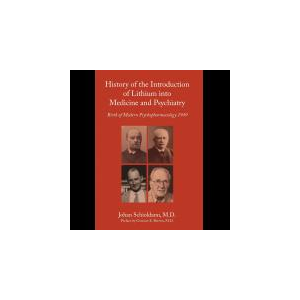
History of the Introduction of Lithium into Medicine and Psychiatry: Birth of modern psychopharmacology 1949
Biographies & Memoirs
Education & Textbooks
Reference
587 views
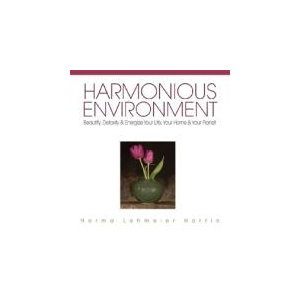
Harmonious Environment: Beautify, Detoxify & Energize Your Life, Your Home & Your Planet
Cooking, Food & Wine
Entertainment & Style
Entertainment & Style
520 views

Searching for a Perfect State of Colorado: My Enlightening Experience Crossing the Weminuche Wilderness Area
Outdoors & Nature
372 views
Life to the Max: Maxims for a Great Life by a Dog named Max
Children's Books
Biographies & Memoirs
Family & Relationships
302 views

Flying Above the Glass Ceiling
Biographies & Memoirs
Entertainment & Style
Professional & Technical
385 views


